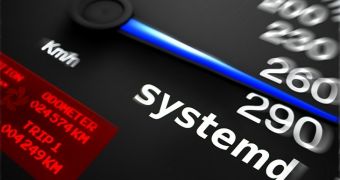systemd, a system and service manager for Linux, compatible with SysV and LSB init scripts, which provides aggressive parallelization capabilities and uses socket and D-Bus activation for starting services, is now at version 211.
systemd developers introduced a lot of new features into the previous 209 version. There were so many, in fact, that the developers actually recommended that it would be best not to adopt the new version into any Linux distro, even if the release was considered stable.
“At this point most of the instabilities we introduced with the massive 209 release should be fixed. That said, we try to keep up the pace and look forward to bring you the next release in two weeks or so, with even more bugfixes, more documentation and a couple of new features,” reads the announcement from Red Hat's Lennart Poettering.
The developer also explained that, in order to get kdbus support, users will have to get --enable-kdbus in the configure command line. Keep in mind that, if you enable kdbus, which for now has only a very limited support, you will lose any chance of getting some sort of API stability.
Lennart Poettering also explained that one of the most important changes in systemd 211 is the support for the Discoverable Partitions Specification. This means that systemd is now able to mount/enable root, swap, /srv, and /home partitions during boot just with the help of the GPT partition table.
Also, a new unit file has been added, which is used for setting RestrictAddressFamilies. This is very useful to minimize the attack surface of services, via exotic protocol stacks.
Two new unit file settings RuntimeDirectory= and RuntimeDirectoryMode= have been implemented, as an alternative for setting up directory permissions by using tmpfiles snippets. According to the developers, the DeviceAllow= unit setting has been updated to support globbing for matching against device group names.
Other changes include the addition of a new --property= setting that allows initialization of resource control properties, the ability for logind to be able to wait at least 30s after each system suspend/resume cycle, the ability to turn off automatic suspending when the laptop lid is being closed, and the sd-bus.h bus API gained a new sd_bus_track object for tracking the life-cycle of bus peers.
A detailed changelog of the new release is available in the mailing list. Download systemd 211 right now from Softpedia.

 14 DAY TRIAL //
14 DAY TRIAL //